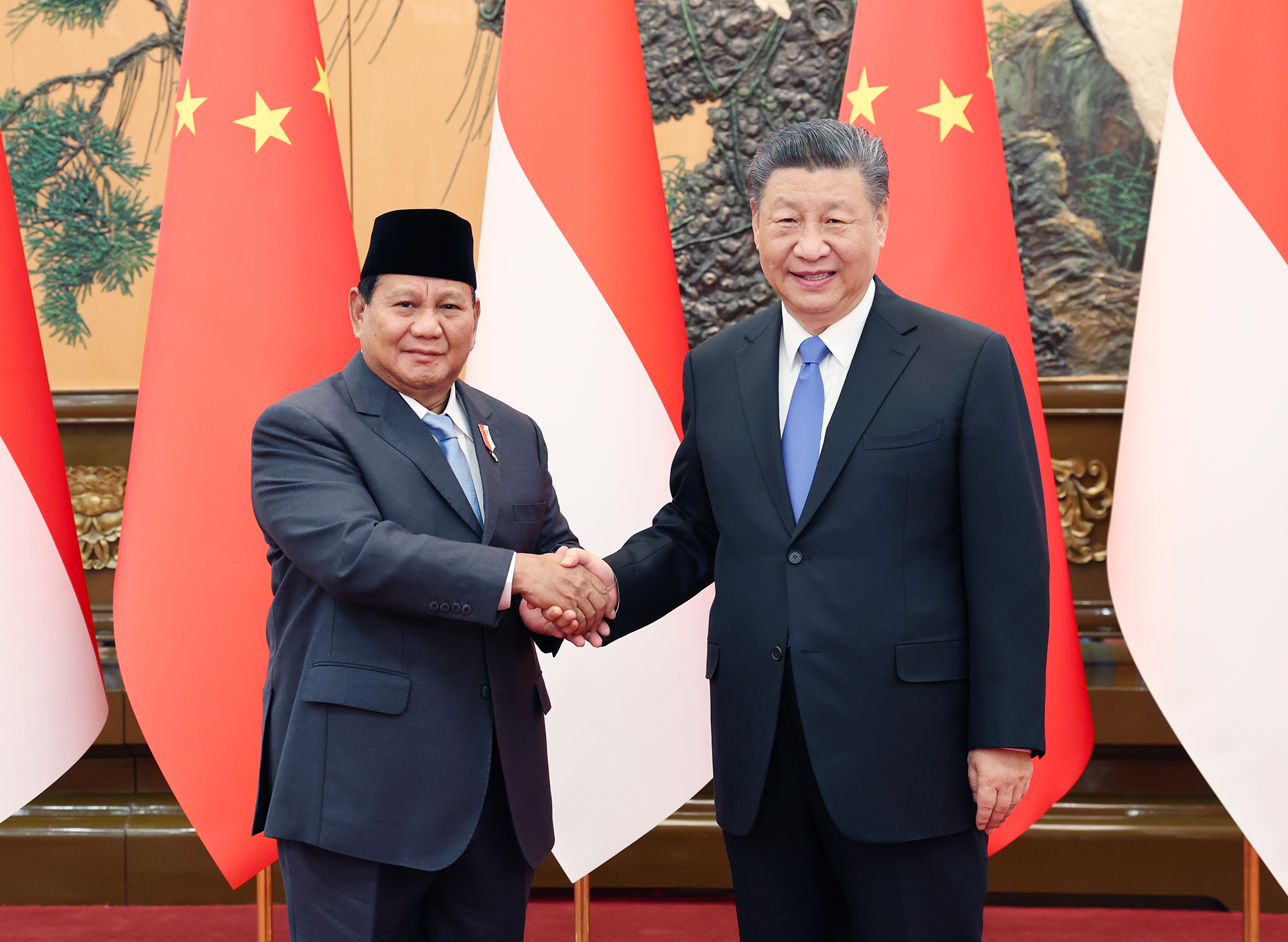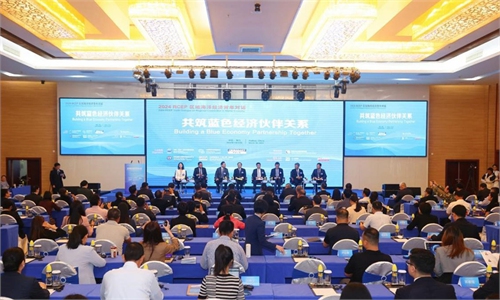Xi meets Prabowo; visit to deepen strategic cooperation
Trip expected to consolidate China-Indonesia mutual political trust

Chinese President Xi Jinping holds talks with President-elect of the Republic of Indonesia Prabowo Subianto at the Great Hall of the People in Beijing on April 1, 2024. Photo: Xinhua
Chinese President Xi Jinping held talks with President-elect of the Republic of Indonesia and Great Indonesia Movement Party General Chairman Prabowo Subianto in Beijing on Monday.
Chinese observers said that Prabowo's visit to China has attracted widespread attention, and his decision to visit China shortly after winning Indonesia's 2024 presidential election on March 20 carries great significance, as this visit is crucial not only for the development of bilateral relations for at least next five years, but also injects positivity and stability into the whole ASEAN region.
Xi congratulated Prabowo on winning the election and asked Prabowo to relay sincere greetings and best wishes to President Joko Widodo.
Recalling the rapidly developing and fruitful bilateral ties over the past decade under the guidance of the two heads of state, Xi said both sides have made Jakarta-Bandung High-speed Railway an exemplar of high-quality bilateral cooperation and entered a new stage of building a community with a shared future.
China views its relations with Indonesia from a strategic and long-term perspective, and is willing to deepen all-round strategic cooperation with Indonesia, Xi said.
He said China will work with Indonesia to build a China-Indonesia community with a shared future that has regional and global influence, so as to bring more benefits to the two peoples and contribute to regional and world peace, stability and prosperity.
Prabowo conveyed President Joko Widodo's sincere greetings to Xi, and said he is delighted to make China the first country he visits after being elected.
Prabowo said he supports the development of a closer relationship with China and will continue the country's friendly policy toward China.
Prabowo's China visit undoubtedly plays a positive role in promoting bilateral relations between China and Indonesia, at least over the next five years, Xu Liping, director of the Center for Southeast Asian Studies at the Chinese Academy of Social Sciences, told the Global Times on Monday.
This visit will no doubt enhance political mutual trust between China and Indonesia, which is particularly important given the current global instability and uncertainty, Xu said, noting that the visit by Indonesia's president-elect to China for dialogue and communication with Chinese leader will contribute significantly to stabilizing the situation.
As the largest country in ASEAN, Indonesia plays a significant role in regional development, and the president-elect's visit to China will promote the development of China-ASEAN friendly relations, according to Chinese observers.
It is expected that bilateral cooperation will be accelerated in the future, especially in areas such as infrastructure and downstream industries. There are prospects for strengthening practical cooperation, including major projects such as capital relocation, he said.
Indonesia has ambitious plans to relocate its capital from Jakarta to Nusantara in East Kalimantan, which is expected to take place by 2045, according to media reports.
Continuing heritage
Prabowo and his running mate Gibran Rakabuming Raka, the son of outgoing President Widodo, known as Jokowi, will be sworn in on October 20 for a five-year term, with the latter becoming vice president. After assuming the presidency, Prabowo is likely to continue the policies of his predecessor, according to Chinese observers.
Prabowo is set to take office as president in October, so he is now forming the cabinet and formulating domestic and foreign policies. Indonesia has long pursued a non-aligned foreign policy, emphasizing pragmatism, expert pointed out. Prabowo's visit to China before assuming office is clearly aimed at promoting further development of China-Indonesia relations, Gu Xiaosong, dean of the ASEAN Research Institute of Hainan Tropical Ocean University, told the Global Times on Monday.
Jokowi's policies have proven crucial for Indonesia's development and are important for regional peace and stability, but the fact that the outgoing president's son is Prabowo's running mate and the vice president-elect could indicate that many factors will drive Prabowo to continue Jokowi's policies, Gu said.
For Indonesia, this visit by Prabowo underscores the appeal of pragmatic cooperation between the two sides, especially against the backdrop of the new government's main task of maintaining economic growth at 5 to 7 percent to achieve the country's Golden Indonesia 2045 Vision, according to Xu.
China plays an important role in supporting Indonesia in achieving its development goal, which is closely related to the Prabowo government's future foreign policy, particularly emphasizing economic diplomacy while also promoting friendly relations with neighboring countries, Xu said.
The Golden Indonesia 2045 Vision is an Indonesian ideal that sets the goal for the country to be a sovereign, advanced, fair and prosperous nation by its centennial in 2045.
China is Indonesia's largest trading partner and has been so for 10 consecutive years, and official data shows that the trade volume between the two countries increased from $50 billion in 2013 to $150 billion in 2022, according to Xinhua.
At the same time, Indonesia is also China's second largest investment destination within ASEAN. Direct investment from China to Indonesia topped $4.55 billion in 2022, according to official data from the Chinese Foreign Ministry.
Such figures underscored and proved the close political and economic ties between the two countries, and in 2023, the completion of the Jakarta-Bandung High-Speed Railway project, a milestone event, embodied the decade of close ties, Gu said.
The Jakarta-Bandung high-speed train, locally called Whoosh, has reportedly become Indonesians' new favorite form of transport during the Eid homecoming exodus. Eid marks the end of the dawn-to-sunset fasting month of Ramadan.
In Indonesia, the most populous Muslim-majority nation, the Eid festival is associated with a homecoming tradition, locally known as mudik, to gather with relatives. The Indonesian government has predicted that at least 193 million people will travel to their hometowns during the Eid exodus season, a number that covers 71.7 percent of the country's total population.
This will be the first Eid moment for the Jakarta-Bandung high-speed train. Indonesia's Ministry of Transportation expects a surge in passengers during the exodus season, which could be up to 1.42 million people.
Regarding escalating tensions in the South China Sea, Gu commented that unlike the Philippines, Indonesia is not easily swayed by the US, as Indonesia does not have major disputes with China, and instead has increasingly close trade and investment relations with the country.
As a leading economy in ASEAN, Indonesia wants to further promote friendly relations between China and ASEAN, and foster cooperation and development in the Asian region. Indonesian leaders well understand that advocating and upholding a policy of non-alignment would be beneficial for both Indonesia and China-ASEAN relations, Gu said.


